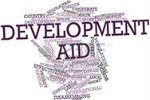Don’t halt UK Development Aid

There are still 350 million children in our world in extreme poverty at risk from death by hunger, lack of clean fresh water, healthcare and with little chance of education, or productive supporting work.
Despite decades of international efforts and resolutions at the United Nations and some real reductions in the scale of poverty world-wide, premature death faces 350 million children today. Certainly the Millennium Development Goals programmes helped but it was really the national strategies of China and India that has made an impact on world poverty figures in the last twenty years. Nevertheless, as a feature in this month’s New Internationalist magazine spells out, the difference in the African village of Sabtenga in Burkino Faso between 1985 and today is remarkable. Water then carried long distances is now accessible from wells and pumps and is clean; the quality of housing has been improved. In 1985 there was no health centre. By 1995 there was a fully functioning one and a maternity unit was added in 2005. There was no school in Sabtenga in 1985. By 1995 a primary school had been built and three more classrooms were added in 2005 with money from debt relief under the HIPC programme. In other words, real development progress is being made through governments, NGO charities and international agencies and often good cooperation between them.
In the 1970’s and 1980’s as poverty disasters of famine reached the TV screens, pressure built for rich governments to help and commit less than 1% (i.e. 0.7%) of GNP (the nation’s estimated wealth) on aid and development. That target was only reached by the British government after cross-party agreement in 2004. Now there is a disturbing political and media campaign to step back from that commitment. The latest headlines call for the £12.4 billion aid budget to be scrapped and spent on the NHS. There is an inevitable turning inwards as stress on the NHS affects the sick and elderly in our communities. But in context of the huge government budgets, the aid spending alone would not cover the cuts to local authorities in social care provision that are a major source of the crisis in healthcare.
It seems that playing those in need off against each other is the easy opt out instead of addressing the full budget structures and maldistribution of resources. Cutting off support for the poorest in the world itself will in no way resolve the UK crisis in health funding and despite all the proper challenges to the misuse of aid and corruption, there is a real danger of cutting off the vital development aid that enables communities to lift themselves out of poverty and not rely on food aid. Government developmental assistance is often distributed through national charities such as CAFOD with a strong presence on the ground in poor countries and with great track records in real development, working with poor people themselves. Shutting down government support and leaving development to philanthropy will be a short term fix for a tiny bit of the health challenges but may condemn those 350 million and future generations to premature deaths.
There is now a real danger of rejecting the principles of genuine ‘development” in favour of a short sighted and short term appeal for emergency aid only approaches. Since the founder of Facebook has declared he is investing $3 billion “to cure, prevent, or manage all diseases by 2100″, there is evidently no need for Government and international programmes. A feature in November’s medical journal, “The Lancet”, questioned the accountability of these philanthropic actions. Funds are channelled through private companies not bound by charity law rules and can be invested in for profit ventures with no obligation to publicly disclose where the money goes. Private individuals begin to determine health priorities and strategies to suit their own business interests Moreover donors can use philanthropy to avoid paying taxes on their business profits thus decreasing the public resources available for services available for all.
Yes there is a need to insist that aid and development funds are accountably and well spent and invested but there is no evidence in history to suggest that privatising aid and development will tackle the roots of poverty and bring about sustainable long term development and human prosperity. In the short term we need to challenge the anti-aid campaign and do it publicly through brief letters to the media, joining in radio phone in programmes and using social media to the full – and CAFOD needs our backing as never before.
*****************************************
